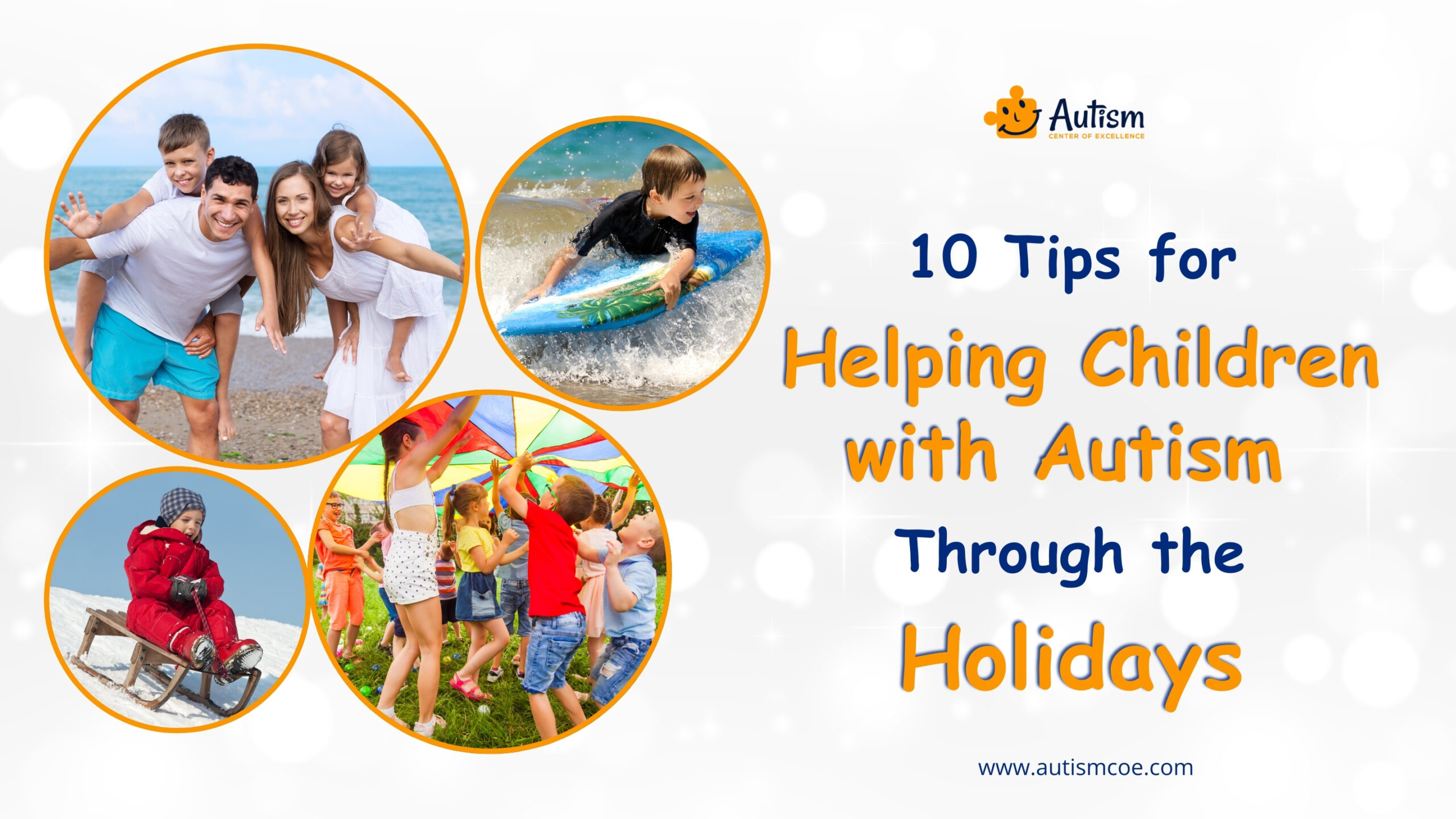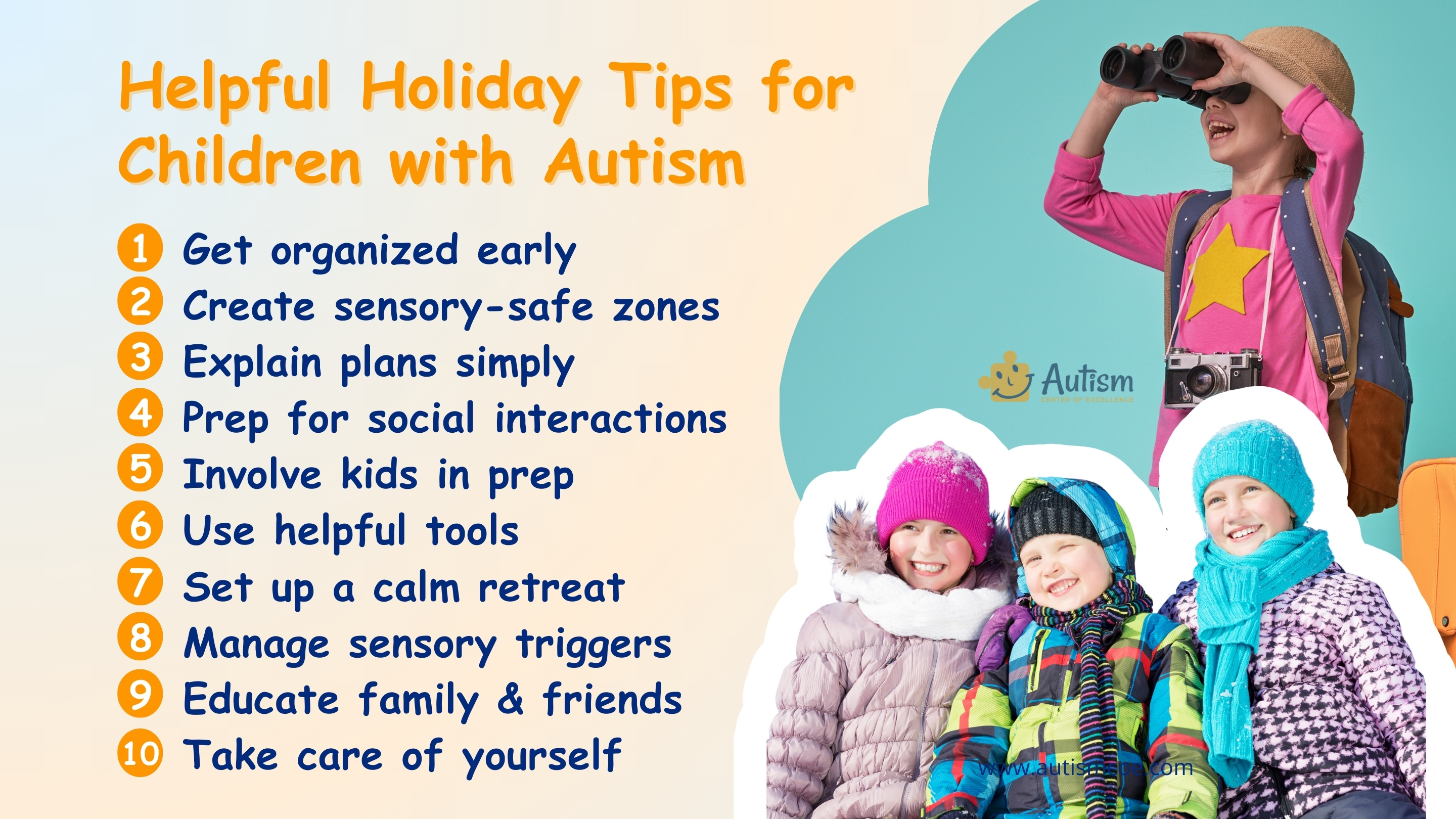10 Tips for Helping Children with Autism Through the Holidays

Holidays can be truly magical, but they can also present challenges, especially for families whose children are autistic. Changing routines, sensory demands and social expectations that usually surface during this time can make children and their caregivers overwhelmed and anxious. It’s upon understanding and support that there will be enjoyment from every holiday.
This blog offers practical tips with 10 actionable pieces of advice specifically tailored to help children with autism and their families navigate the holiday season successfully.

1️⃣ Get Organized Early for Less Stress
Preparation is the best way to reduce stress during the holidays. For autistic children, structured schedules and predictable routines can be comforting, so it’s helpful to map out the holiday activities in advance.
- Use Visual Supports such as calendars or daily planners to outline events, including mealtimes, outings, or visits.
- If you have a child using apps, then you have an app called Choice works, allowing you to design visual schedules on a tablet or smart phone.
- Discuss the plans daily and remind your child of expectations.
Planning ensures smoother transitions and reduces anxiety for the child—and for you.
2️⃣ Build Relaxing, Sensory-Safe Zones
Holidays often bring Sensory Triggers: bright lights, loud music, and crowded crowds. A sensory-friendly environment is a must for your child to feel safe and comfortable. Here are some ideas to create such an environment:
- At home, set up a quiet corner with familiar items like weighted blankets, noise-canceling headphones, or favorite toys.
- When attending public gatherings, identify spaces where your child can retreat if overwhelmed. Communicate with event organizers in advance to explore accommodations, like dimmed lighting or noise-free zones.
A little preparation can make environments less overwhelming and allow your child to have a good time.
3️⃣ Explain Holiday Plans Clearly and Simply
Changes to routines or activities during the holiday season can be confusing for autistic children. Clear communication about what they are going to experience, however, can help alleviate some of the surprises that may cause anxiety.
- Social stories are an excellent tool for explaining specific holiday events, such as going to visit family or decorate the house. Visual sequences can prepare your child to know each step in a process.
- Provide consistent reminders leading up to the event to ensure they feel ready.
When children understand what’s happening, they feel more secure and confident.
4️⃣ Prepare Autistic Children for Social Interactions
The holidays would often mean spending time with relatives and friends, sometimes overwhelming some children. With some preparation, helping the child practice social interactions ahead of time can smoothen the transition for them.
- Try role-playing scenarios like greeting relatives or saying “thank you” when receiving a gift.
- Teach simple scripts for common interactions, for example, saying “hello” or declining something nicely.
Preparing in advance can give your child the tools they need to feel engaged—and less stressed in social settings.
5️⃣ Involve the Child in Holiday Preparations
Involving your child in holiday, preparation makes them feel like part of the festivities and increases their confidence and Social Skills.
- You may engage them in decorating the tree, wrapping gifts, or setting the table.
- Engage them in activities according to their interests, like placing ornaments or using a favorite color theme for crafts.
When children feel involved, they’re more likely to enjoy and engage with the holiday activities.
6️⃣ Use Apps and Tools to Make Holidays Easier
Technology can be helpful in that it can help bridge both learning and communication during holidays.
- Use Apps such as Proloquo2Go or Avaz to support the child on non-verbal communication which may help the child have their feelings or needs through busy settings.
- Educational holiday-themed games make learning a fun while reinforcing the spirit of being in the holiday season.
Leverage technology as a positive tool to enhance your child’s holiday experience.
7️⃣ Set Up a Calm Retreat for Overwhelming Moments
Having a designated “Safe Space” Can Provide Your Child with A Calming Retreat Whenever Things Get Overwhelming.
- At Home, Create a Sensory-Friendly Nook with Soft Lighting, Soothing Music, and Comforting Items.
- When Visiting Others, Ask Ahead to Set up A Space Where Your Child Can Take Breaks if Needed.
Establishing this sanctuary ensures your child always has a place to recharge.
8️⃣ Spot and Manage Sensory Overload Triggers
When the senses are overwhelmed by too much stimulation, it leads to sensory overload. It’s easy to recognize the signs—covering ears, pacing, or irritability—which will help you intervene immediately.
- Prepare by keeping a Sensory Toolkit with essentials like sunglasses to reduce bright lights, or ear defenders to muffle sound.
- Space out activities to avoid too many high-energy events in a row.
By anticipating potential triggers, you can help your child stay calm and comfortable.
9️⃣ Foster Understanding and Support from Family and Friends
Your extended family and friends may not fully Understand Autism. Educating them about your child’s needs ensures everyone works together to create an inclusive and supportive environment.
- Share a brief guide or video about autism to help raise awareness.
- Be clear and kind when explaining your child’s preferences, sensitivities, and strategies for communicating with them.
When everyone’s on the same page, gatherings become more enjoyable for your child and the entire family.
🔟 Remember to Care for Yourself Too
Parenting is rewarding but can also be exhausting—especially during the holidays. Remember that your well-being is just as crucial as your child’s.
- Set boundaries to avoid overcommitting yourself during the season.
- Make time for self-care, whether it’s a relaxing bath, a quick walk, or 15 minutes of quiet reading.
Looking after yourself ensures you’re better equipped to meet your family’s needs while enjoying the holidays.
Enjoying Reading?
Join Our Weekly Newsletters!
Subscribe now to stay updated with our latest email updates.
Frequently Asked Questions & Answer
What Challenges Do Children with Autism Face During the Holidays?
Children with autism may struggle with changes in routine, sensory overload from decorations or loud gatherings, and difficulty understanding social expectations. Preparing in advance can help address these challenges.
What Should I Do if My Child Has a Meltdown at a Holiday Event?
Stay calm, acknowledge their feelings, and provide a quiet space for them to regulate. It’s helpful to have a plan in place and communicate with hosts about potential needs.
How Can I Explain Autism Accommodations to Friends and Family During Holiday Gatherings?
Use simple, respectful language to explain your child’s needs. For example, “Loud sounds can be overwhelming for [child’s name], so we’re providing headphones to help them enjoy the event comfortably.”
What Gift Ideas are Suitable for Children with Autism?
Consider sensory-friendly toys, items that align with their special interests, or tools that support skill development, such as puzzles, weighted blankets, or communication aids.
Create Meaningful Holiday Memories
The holiday season offers countless opportunities to create cherished memories, but these moments don’t happen by chance—they require thoughtful planning, support, and adaptability.
At AutismCOE ABA Clinic, we recognize the unique challenges that holidays can present for children with autism and their families. By following these 10 practical tips, you can turn potential holiday stress into meaningful and joyful experiences for your child and loved ones.
Every child is unique, and what works for one child may not work for another. What is important is to try, be patient, and find out what helps your family enjoy this special time of the year.
Please Note: The content of this blog is for informational purposes only and should not be considered a substitute for professional medical advice, diagnosis, or treatment. Consult a qualified healthcare professional for personalized guidance tailored to your specific situation.

Bhavika Bhasin
Bhavika Bhasin is the Research and Marketing officer at AutismCOE. She works with children and adults with ASD. Her clinical research includes evaluating various available autism screening and diagnosis methods and their efficacy. She is currently developing a novel screening exam that is indicated to be more accurate than the existing available exams. She is also writes articles papers for various publications.

